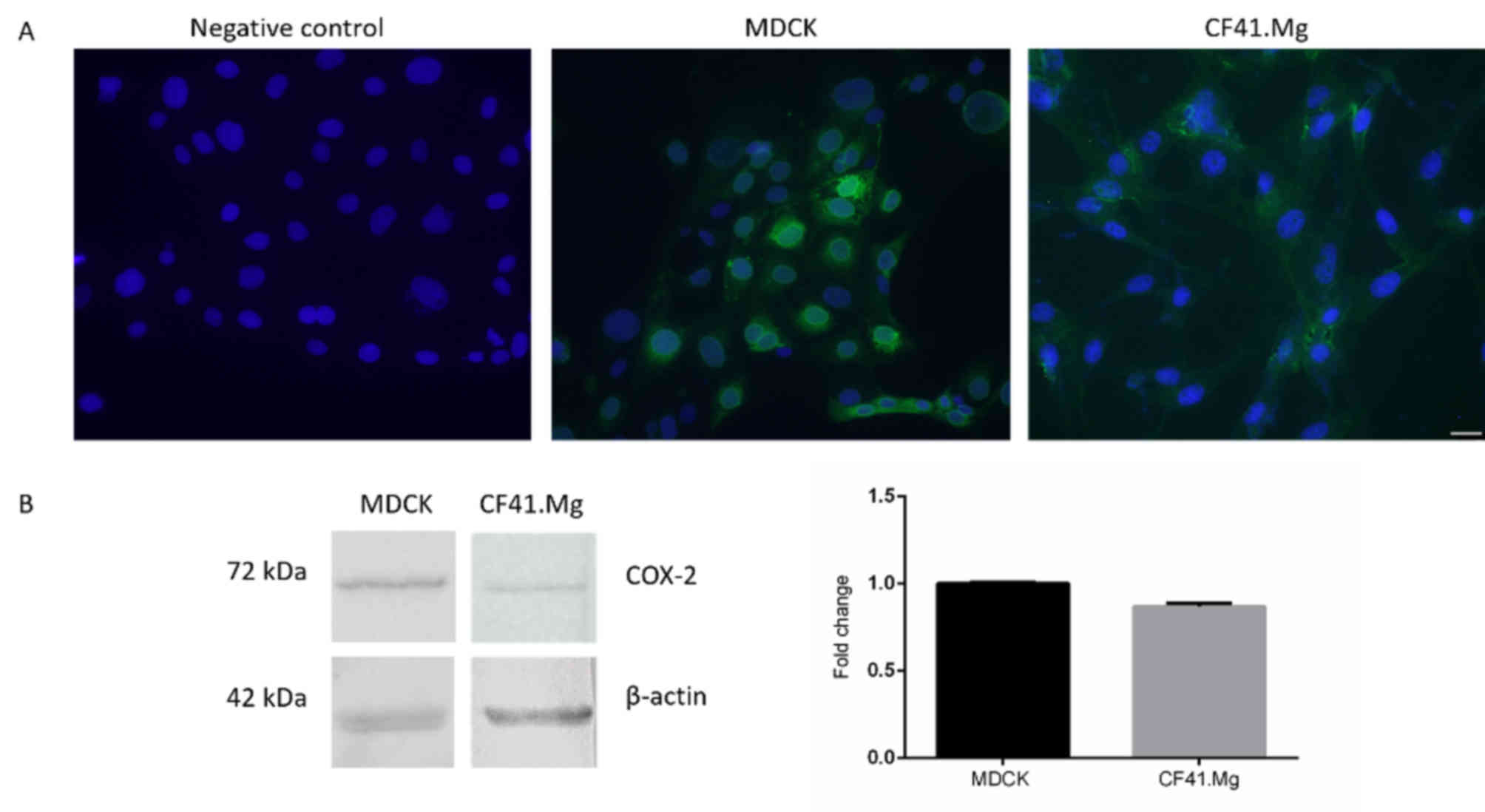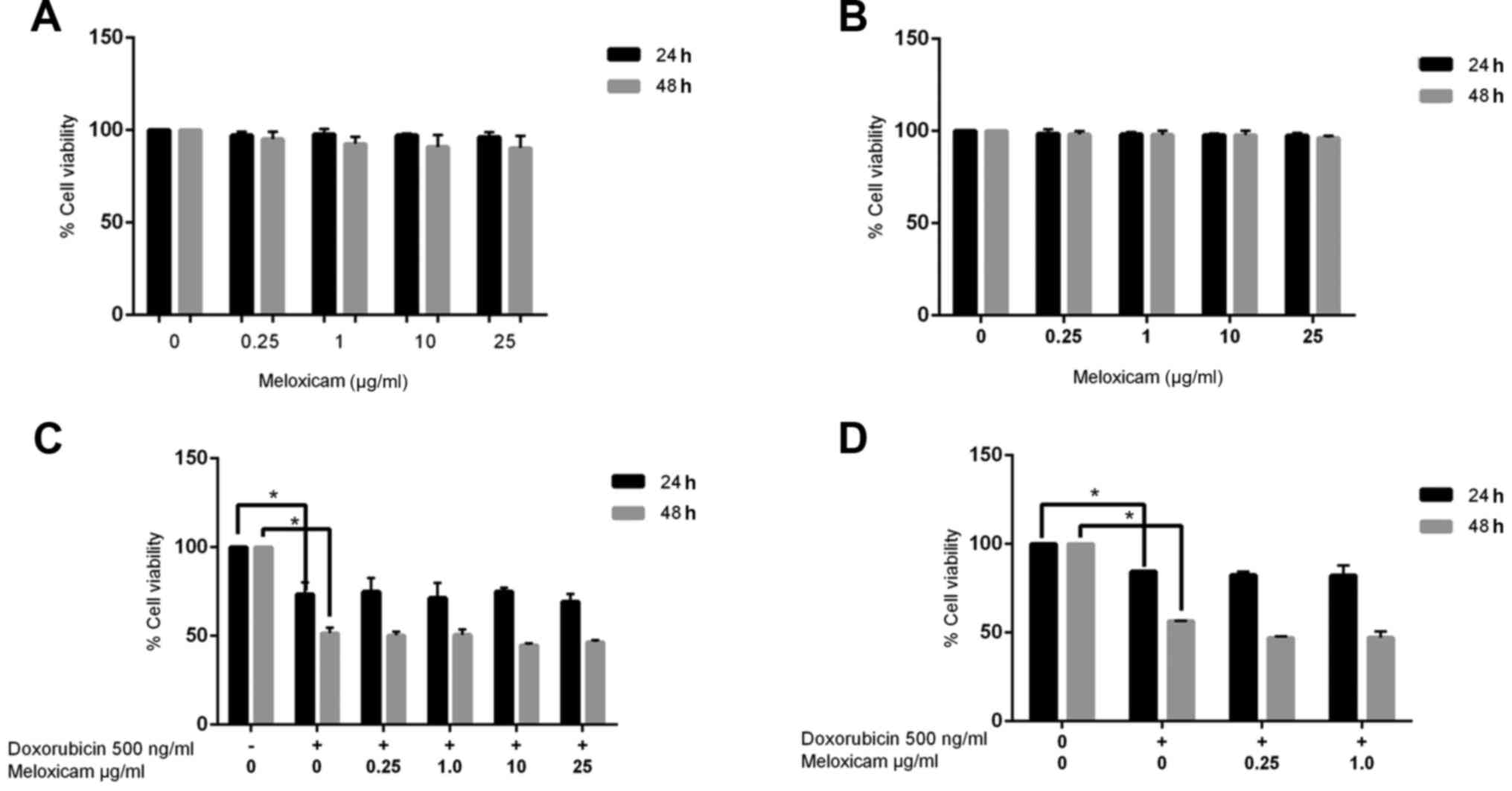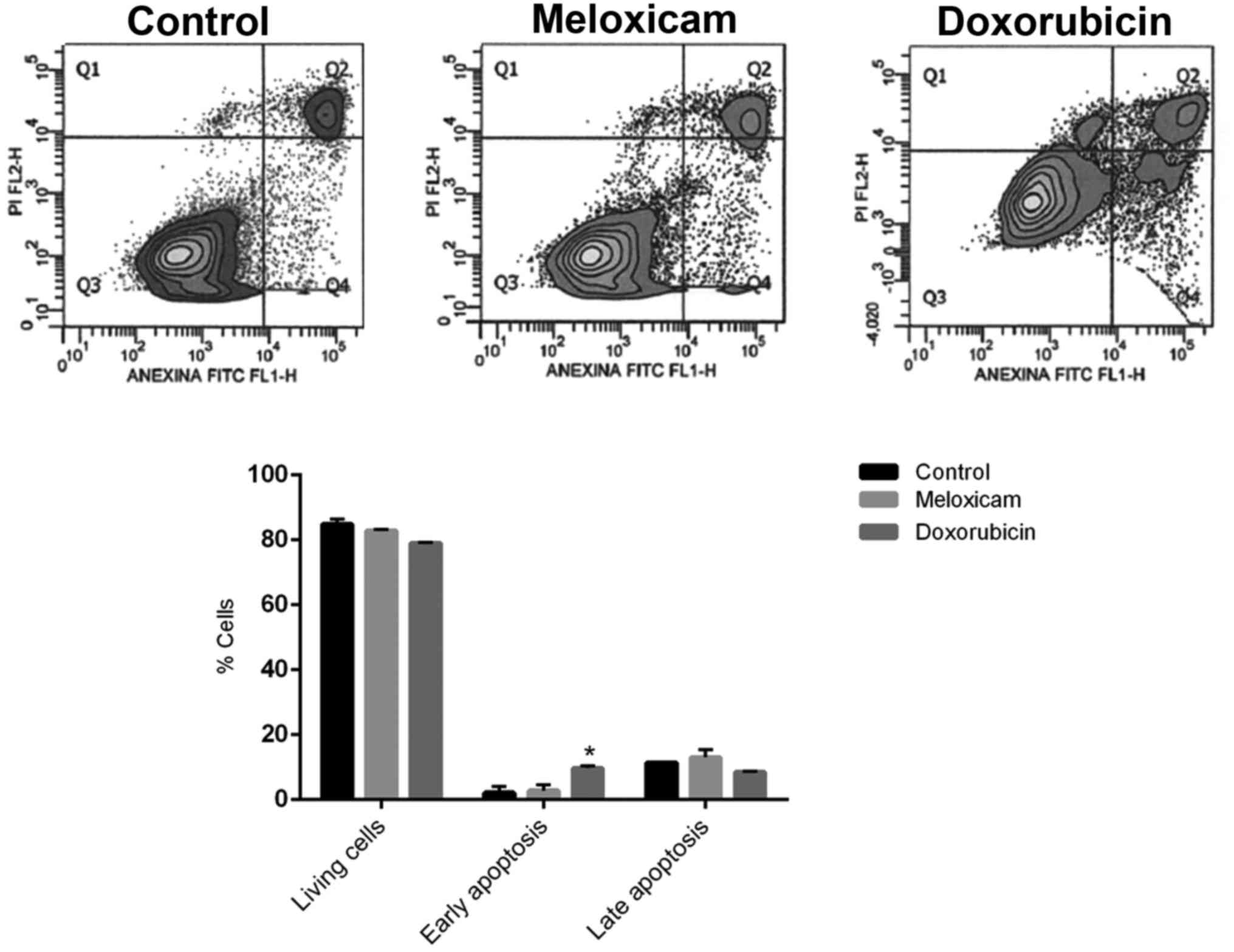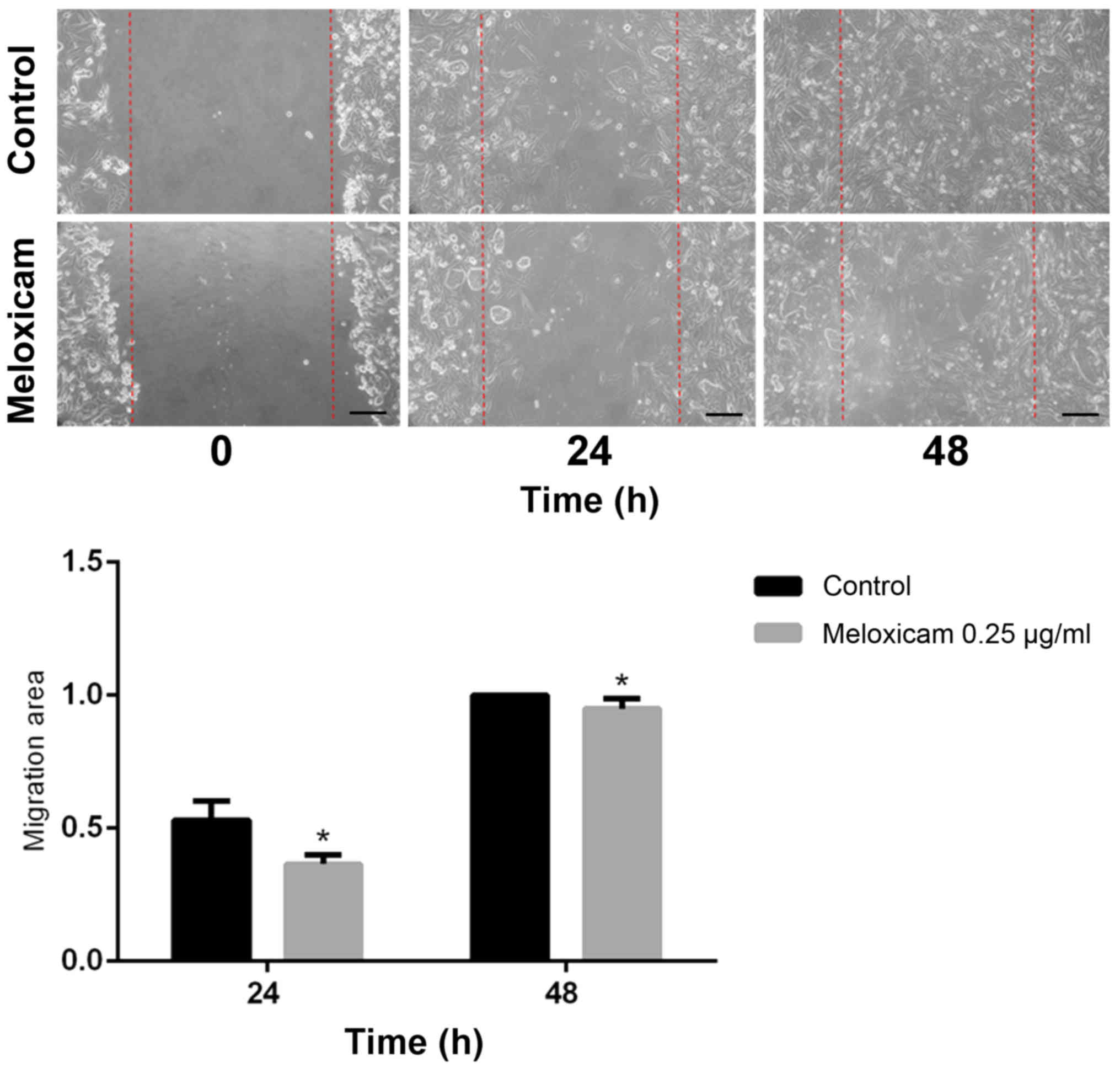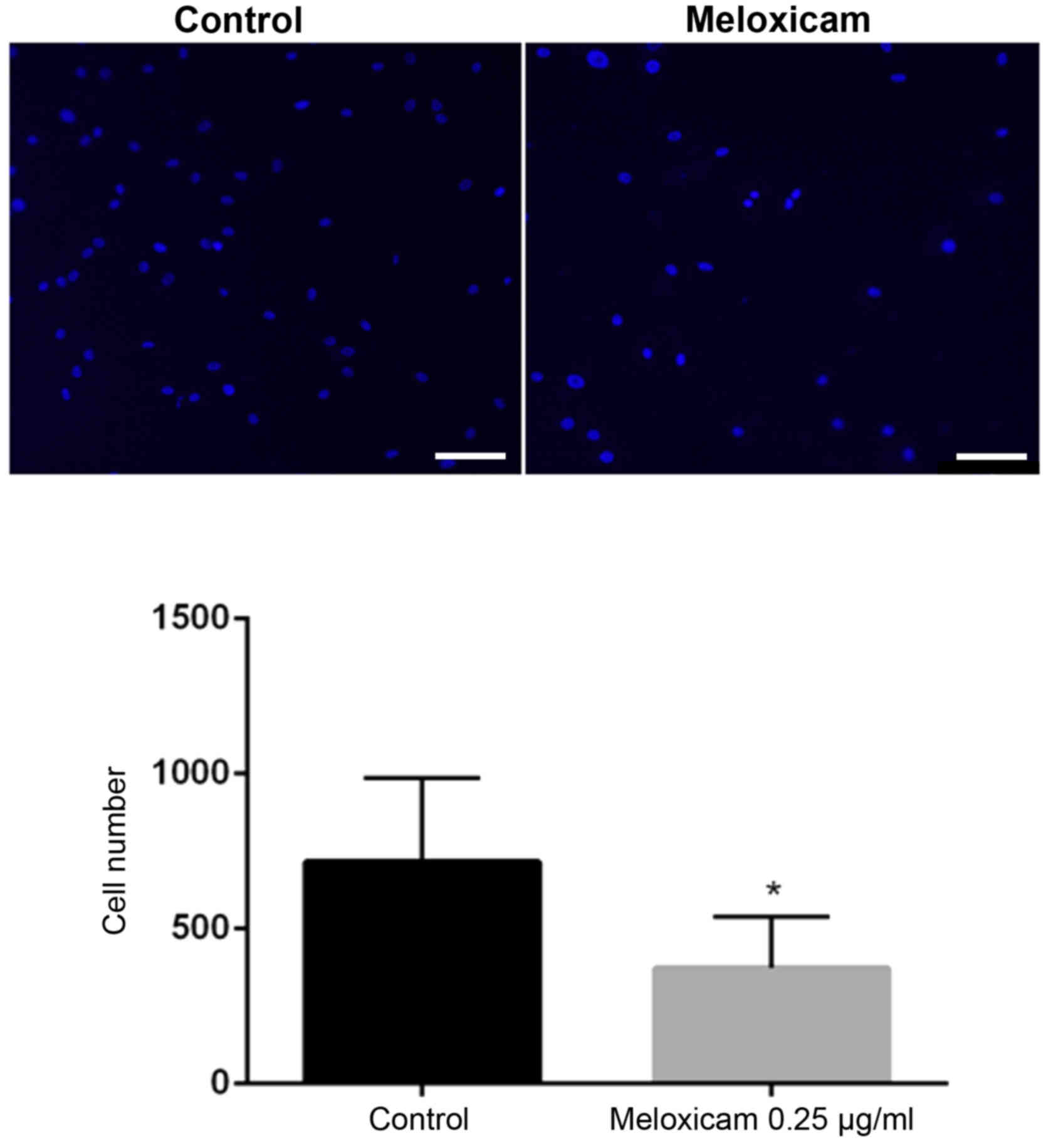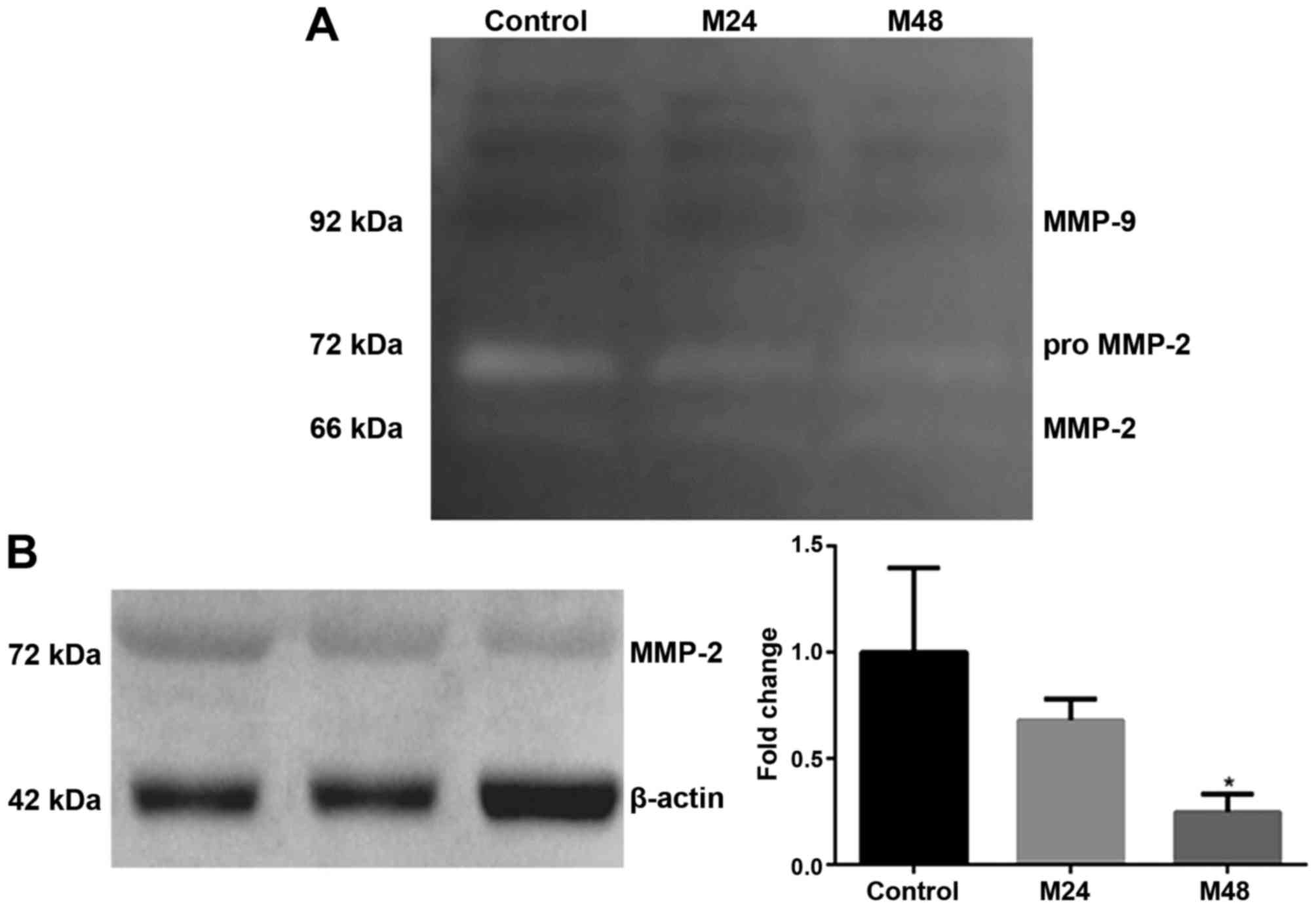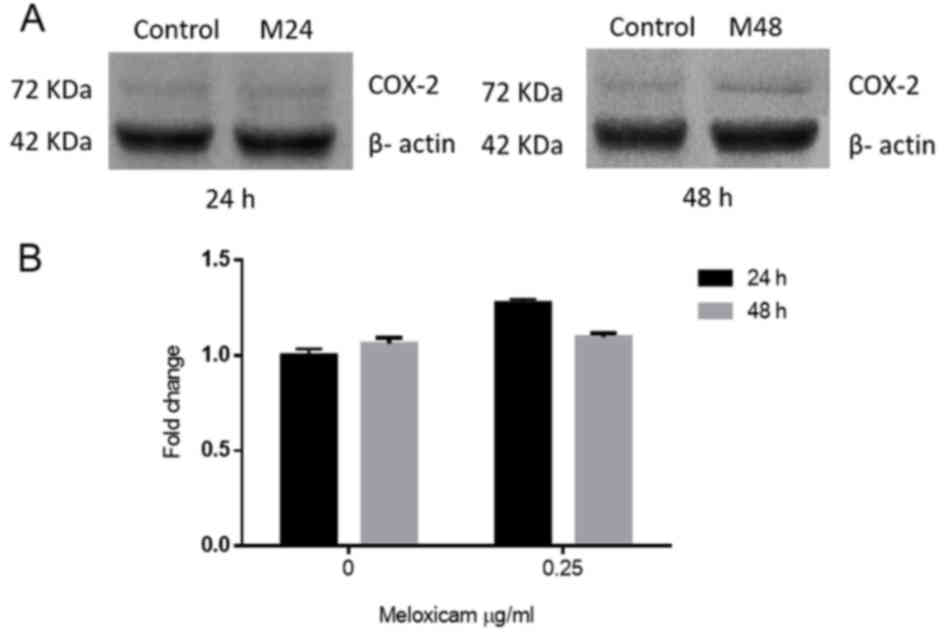|
1
|
Arenas C, Peña L, Granados-Soler JL and
Pérez-Alenza MD: Adjuvant therapy for highly malignant canine
mammary tumours: Cox-2 inhibitor versus chemotherapy: A
case-control prospective study. Vet Rec. 179:1252016. View Article : Google Scholar : PubMed/NCBI
|
|
2
|
Torres CG, Pino AM and Sierralta WD: A
cyclized peptide derived from alpha fetoprotein inhibits the
proliferation of ER-positive canine mammary cancer cells. Oncol
Rep. 21:1397–1404. 2009.PubMed/NCBI
|
|
3
|
Cao Y and Prescott SM: Many actions of
cyclooxygenase-2 in cellular dynamics and in cancer. J Cell
Physiol. 190:279–286. 2002. View Article : Google Scholar : PubMed/NCBI
|
|
4
|
Hanahan D and Weinberg RA: Hallmarks of
cancer: The next generation. Cell. 144:646–674. 2011. View Article : Google Scholar : PubMed/NCBI
|
|
5
|
Williams CS, Mann M and DuBois RN: The
role of cyclooxygenases in inflammation, cancer, and development.
Oncogene. 18:7908–7916. 1999. View Article : Google Scholar : PubMed/NCBI
|
|
6
|
Hugo HJ, Saunders C, Ramsay RG and
Thompson EW: New insights on COX-2 in chronic inflammation driving
breast cancer growth and metastasis. J Mammary Gland Biol
Neoplasia. 20:109–119. 2015. View Article : Google Scholar : PubMed/NCBI
|
|
7
|
Soslow RA, Dannenberg AJ, Rush D, Woerner
B, Khan KN, Masferrer J and Koki AT: COX-2 is expressed in human
pulmonary, colonic, and mammary tumors. Cancer. 89:2637–2645. 2000.
View Article : Google Scholar : PubMed/NCBI
|
|
8
|
Khan KN, Knapp DW, Denicola DB and Harris
RK: Expression of cyclooxygenase-2 in transitional cell carcinoma
of the urinary bladder in dogs. Am J Vet Res. 61:478–481. 2000.
View Article : Google Scholar : PubMed/NCBI
|
|
9
|
Lavalle GE, De Campos CB, Bertagnolli AC
and Cassali GD: Canine malignant mammary gland neoplasms with
advanced clinical staging treated with carboplatin and
cyclooxygenase inhibitors. In Vivo. 26:375–379. 2012.PubMed/NCBI
|
|
10
|
Doré M, Lanthier I and Sirois J:
Cyclooxygenase-2 expression in canine mammary tumors. Vet Pathol.
40:207–212. 2003. View Article : Google Scholar : PubMed/NCBI
|
|
11
|
Queiroga FL, Alves A, Pires I and Lopes C:
Expression of COX-1 and COX-2 in canine mammary tumors. J Comp
Pathol. 136:177–185. 2007. View Article : Google Scholar : PubMed/NCBI
|
|
12
|
Rozic JG, Chakraborty C and Lala PK:
Cyclooxygenase inhibitors retard murine mammary tumor progression
by reducing tumor cell migration, invasiveness and angiogenesis.
Int J Cancer. 93:497–506. 2001. View
Article : Google Scholar : PubMed/NCBI
|
|
13
|
Lee KY, Kim YJ, Yoo H, Lee SH, Park JB and
Kim HJ: Human brain endothelial cell-derived COX-2 facilitates
extravasation of breast cancer cells across the blood-brain
barrier. Anticancer Res. 31:4307–4313. 2011.PubMed/NCBI
|
|
14
|
Stetler-Stevenson WG: Type IV collagenases
in tumor invasion and metastasis. Cancer Metastasis Rev. 9:289–303.
1990. View Article : Google Scholar : PubMed/NCBI
|
|
15
|
Roarty K and Rosen JM: Wnt and mammary
stem cells: Hormones cannot fly wingless. Curr Opin Pharmacol.
10:643–649. 2010. View Article : Google Scholar : PubMed/NCBI
|
|
16
|
Pang LY and Argyle D: Cancer stem cells
and telomerase as potential biomarkers in veterinary oncology. Vet
J. 185:15–22. 2010. View Article : Google Scholar : PubMed/NCBI
|
|
17
|
Dempke W, Rice C, Grothey A and Schmoll
HJ: Cyclooxygenase-2: A novel target for cancer chemotherapy? J
Cancer Res Clin Oncol. 127:411–417. 2001. View Article : Google Scholar : PubMed/NCBI
|
|
18
|
Shaheen NJ, Straus WL and Sandler RS:
Chemoprevention of gastrointestinal malignancies with nonsteroidal
antiinflammatory drugs. Cancer. 94:950–963. 2002. View Article : Google Scholar : PubMed/NCBI
|
|
19
|
Sonzogni-Desautels K, Knapp DW, Sartin E
and Doré M: Effect of cyclooxygenase inhibitors in a xenograft
model of canine mammary tumours. Vet Comp Oncol. 9:161–171. 2011.
View Article : Google Scholar : PubMed/NCBI
|
|
20
|
Pang LY, Argyle SA, Kamida A, Morrison KO
and Argyle DJ: The long-acting COX-2 inhibitor mavacoxib
(Trocoxil™) has anti-proliferative and pro-apoptotic effects on
canine cancer cell lines and cancer stem cells in vitro. BMC Vet
Res. 10:1842014. View Article : Google Scholar : PubMed/NCBI
|
|
21
|
Streppa HK, Jones CJ and Budsberg SC:
Cyclooxygenase selectivity of nonesteroidal anti-inflammatory drugs
in canine blood. Am J Vet Res. 63:91–94. 2002. View Article : Google Scholar : PubMed/NCBI
|
|
22
|
Luna SP, Basilio AC, Steagall PV, Machado
LP, Mountinho FQ, Takahira RK and Brandão CV: Evaluation of adverse
effects of long-term oral administration of carprofen, etodolac,
flunixin meglumine, ketoprofen, and meloxicam in dogs. Am J Vet
Res. 68:258–264. 2007. View Article : Google Scholar : PubMed/NCBI
|
|
23
|
Knottenbelt C, Chambers G, Gault E and
Argyle DJ: The in vitro effects of piroxicam and meloxicam on
canine cell lines. J Small Anim Pract. 47:14–20. 2006. View Article : Google Scholar : PubMed/NCBI
|
|
24
|
Saito T, Tamura D and Asano R: Usefulness
of selective COX-2 inhibitors as therapeutic agents against canine
mammary tumors. Oncol Rep. 31:1637–1644. 2014.PubMed/NCBI
|
|
25
|
Saito T, Dai T and Asano R: The hyaluronan
synthesis inhibitor 4-methylumbelliferone exhibits antitumor
effects against mesenchymal-like canine mammary tumor cells. Oncol
Let. 5:1068–1074. 2013.
|
|
26
|
Busch U, Schmid J, Heinzel G, Schmaus H,
Baierl J, Huber C and Roth W: Pharmacokinetics of meloxicam in
animals and the relevance to humans. Drug Metab Dispos. 26:576–584.
1998.PubMed/NCBI
|
|
27
|
Selting KA, Ogilvie GK, Gustafson DL, Long
ME, Lana SE, Walton JA, Hansen RA, Turner AS, Laible I and Fettman
MJ: Evaluation of the effects of dietary n-3 fatty acid
supplementation on the pharmacokinetics of doxorubicin in dogs with
lymphoma. Am J Vet Res. 67:145–151. 2006. View Article : Google Scholar : PubMed/NCBI
|
|
28
|
Lavalle GE, Bertagnolli AC, Tavares WL and
Cassali GD: COX-2 expression in canine mammary carcinomas:
Correlation with angiogenesis and overall survival. Vet Pathol.
46:1275–1280. 2009. View Article : Google Scholar : PubMed/NCBI
|
|
29
|
Prada J, Queiroga FL, Gregório H and Pires
I: Evaluation of cyclooxygenase-2 expression in canine mast cell
tumours. J Comp Pathol. 147:31–36. 2012. View Article : Google Scholar : PubMed/NCBI
|
|
30
|
Aubry J, Blaecke A, Lecoanet-Henchoz S,
Jeannin P, Herbault N, Caron G, Moine V and Bonnefory JY: Annexin V
used for measuring apoptosis in the early events of cellular
cytotoxicity. Cytometry. 37:197–204. 1999. View Article : Google Scholar : PubMed/NCBI
|
|
31
|
Tamura D, Saito T, Murata K, Kawashima M
and Asano R: Celecoxib exerts antitumor effects in canine mammary
tumor cells via COX-2-independent mechanisms. Int J Oncol.
46:1393–1404. 2015.PubMed/NCBI
|
|
32
|
Zhong S, Zhang X, Chen L, Ma T, Tang J and
Zhao J: Association between aspirin use and mortality in breast
cancer patients: A meta-analysis of observational studies. Breast
Cancer Res Treat. 150:199–207. 2015. View Article : Google Scholar : PubMed/NCBI
|
|
33
|
Knapp DW, Richardson RC, Bottoms GD,
Teclaw R and Chan TC: Phase I trial of piroxicam in 62 dogs bearing
naturally occurring tumours. Cancer Chemother Pharmacol.
29:214–218. 1992. View Article : Google Scholar : PubMed/NCBI
|
|
34
|
De M, Souza CH, Toledo-Piza E, Amorin R,
Barboza A and Tobias KM: Inflammatory mammary carcinoma in 12 dogs:
Clinical features, cyclooxygenase-2 expression, and response to
piroxicam treatment. Can Vet J. 50:506–510. 2009.PubMed/NCBI
|
|
35
|
Montoya L, Ambros L, Kreil V, Bonafine R,
Albarellos G, Hallu R and Soraci A: A pharmacokinetic comparison of
meloxicam and ketoprofen following oral administration to healthy
dogs. Vet Res Commun. 28:415–428. 2004. View Article : Google Scholar : PubMed/NCBI
|
|
36
|
Kay-Mugford P, Benn S, LaMarre J and
Conlon P: In vitro effects of nonsteroidal anti-inflammatory drugs
on cyclooxygenase activity in dogs. Am J Vet Res. 61:802–810. 2000.
View Article : Google Scholar : PubMed/NCBI
|
|
37
|
Larkins TL, Nowell M, Singh S and Sanford
GL: Inhibition of cyclooxygenase-2 decreases breast cancer cell
motility, invasion and matrix metalloproteinase expression. BMC
Cancer. 6:1812006. View Article : Google Scholar : PubMed/NCBI
|
|
38
|
Wolfesberger B, Hoelzl C, Walter I, Reider
GA, Fertl G, Thalhammer JG, Skalicky M and Egerbacher M: In vitro
effects of meloxicam with or without doxorubicin on canine
osteosarcoma cells. J Vet Pharmacol Ther. 29:15–23. 2006.
View Article : Google Scholar : PubMed/NCBI
|
|
39
|
Brunelle M, Sartin EA, Wolfe LG, Sirois J
and Doré M: Cyclooxygenase-2 expression in normal and neoplastic
canine mammary cell lines. Vet Pathol. 43:656–666. 2006. View Article : Google Scholar : PubMed/NCBI
|
|
40
|
Schrey MP and Patel KV: Prostaglandin E2
production and metabolism in human breast cancer cells and breast
fibroblasts. Regulation by inflammatory mediators. Br J Cancer.
72:1412–1419. 1995. View Article : Google Scholar : PubMed/NCBI
|
|
41
|
Waskewich C, Blumenthal RD, Li H, Stein R,
Goldenberg DM and Burton J: Celecoxib exhibits the greatest potency
amongst cyclooxygenase (COX) inhibitors for growth inhibition of
COX-2 negative hematopoietic and epithelial cell lines. Cancer Res.
62:2029–2033. 2002.PubMed/NCBI
|
|
42
|
De Monte C, Carradori S, Gentili A,
Mollica A, Trisciuoglio D and Supuran CT: Dual cyclooxygenase and
carbonic anhydrase inhibition by nonsteroidal anti-inflammatory
drugs for the treatment of cancer. Curr Med Chem. 22:2812–2818.
2015. View Article : Google Scholar : PubMed/NCBI
|
|
43
|
Chu CY, Jin YT, Zhang W, Yu J, Yang HP,
Wang HY, Zhang ZJ, Liu XP and Zou Q: CA IX is upregulated in
CoCl2-induced hypoxia and associated with cell invasive potential
and a poor prognosis of breast cancer. Int J Oncol. 48:271–280.
2016.PubMed/NCBI
|















